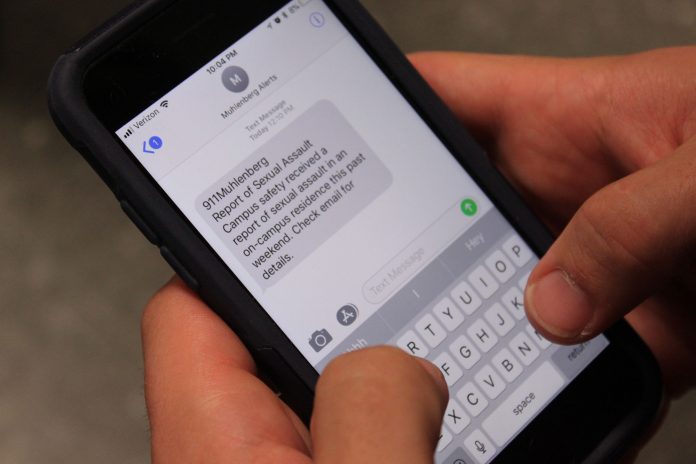On Tuesday, Sept. 18 at around noon, a text and email notification from Bill Keller, Executive Director of Office of Communications, was sent out to the entire campus community reporting that an incident of sexual assault occurred in an on-campus residence hall that past weekend.
The implementation and usage of this campus-wide alert system, known formally as the E2Campus emergency alert system, is in accordance with The Clery Act.
According to a news report that The Muhlenberg Weekly covered last year about the Benfer armed robbery, “The Clery Act, named after a Lehigh University freshman who was raped and murdered in 1986, was amended following the Virginia Tech mass shooting to require institutions to issue ‘timely warnings’ in the event of an incident that threatens the safety of students or employees.”
“We have a requirement under Clery to send timely warnings when it is appropriate,” explains Brian Fidati, Director & Chief of Campus Safety. “Given the circumstances of the event we determined that it would be appropriate…even though it was a couple days ago, it still qualified.”
Fidati explained the reasons for the gap in time between the occurrence of the incident and the notification.
“The incident occurred over the weekend; however, at that time I did not have enough detail to make a judgement call on what was being reported. I had very little information,” said Fidati.
Although the incident did occur over the weekend, the individual did not report it to Campus Safety until Monday, and more information still had to be obtained before it would be suitable to send out to the rest of campus.
There also has to be a degree of communication with the person reporting the incident.
“We don’t send the campus [timely warnings] without notifying the impacted person. We don’t want it to be a surprise to them, so there was a delay in making contact with that individual,” noted Fidati.
Once the individual was notified, the decision about what was actually going to be included in the emergency alert was appropriately limited.
Fidati points out that they can “only share information to a degree to let people know that something happened, and draw attention to the sexual misconduct policy.”
Protecting the identity of the impacted individual or individuals is extremely important, but depending on whether or not there is an immediate threat to campus, more information will always be included if necessary.
“If there was an immediate threat to the campus we would give people the information they needed to make an assessment about how to keep themselves safe,” explains Fidati.
Lin-Chi Wang, Associate Dean of Students & Director of Equity and Title IX, could not be reached by Campus Safety prior to sending out the alert.
“I would say the most powerful thing that you could take away is an awareness that this does occur, and that there are circumstances that lead to this,” says Fidati. “People should read that sexual misconduct policy and understand what constitutes sexual misconduct so they can know where those boundaries should be in terms of consent.”
Additional reporting by Chloe Gravereaux.
Sydney Coplin is a senior majoring in Media and Communication. She is currently spending her final semester of college interning and studying in Washington, D.C. She has previously been on staff as News Editor and Managing Editor.






















